Adapted from Various Sources.
St. Wilfrid, Bishop of York and Apostle of Friesland († 709; Feast – October 12)
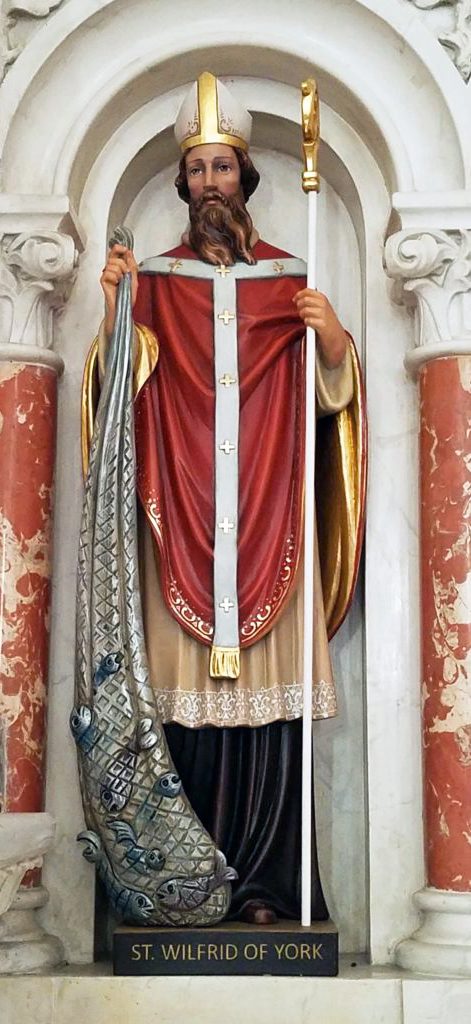 St. Wilfrid was born in the Kingdom of Northumbria, towards the year 634. At fourteen years of age he was sent to the monastery
of Lindisfarne that he might be trained in the study of the sacred sciences, in which he showed an application, penetration, and
maturity of judgment beyond his years. A desire of greater improvement than he could attain to in that place, where he perceived
the discipline that was practiced to be imperfect, led him upon a project of traveling into France and Italy. He made a short stay
at Canterbury, where he studied the Roman discipline, and learned the Psalms according to the Roman version, instead of that of
St. Jerome, which he had used before. (St. Jerome actually produced three Latin translations of the Psalms: the Roman version –
which was merely a revision of that which had already been in use before his time, and which was used in the Roman Missal;
the Gallican version – based on the Greek text, and which was used in the Vulgate Bible and the Roman Breviary; and the Hebrew version –
based on the Hebrew manuscripts then available. St. Jerome considered this last to be the most accurate, but it was not widely accepted.
It is frequently referred to as
St. Wilfrid was born in the Kingdom of Northumbria, towards the year 634. At fourteen years of age he was sent to the monastery
of Lindisfarne that he might be trained in the study of the sacred sciences, in which he showed an application, penetration, and
maturity of judgment beyond his years. A desire of greater improvement than he could attain to in that place, where he perceived
the discipline that was practiced to be imperfect, led him upon a project of traveling into France and Italy. He made a short stay
at Canterbury, where he studied the Roman discipline, and learned the Psalms according to the Roman version, instead of that of
St. Jerome, which he had used before. (St. Jerome actually produced three Latin translations of the Psalms: the Roman version –
which was merely a revision of that which had already been in use before his time, and which was used in the Roman Missal;
the Gallican version – based on the Greek text, and which was used in the Vulgate Bible and the Roman Breviary; and the Hebrew version –
based on the Hebrew manuscripts then available. St. Jerome considered this last to be the most accurate, but it was not widely accepted.
It is frequently referred to as that of St. Jerome,
even though all three translations were his work.)
In 653 St. Benedict Biscop, his countryman, passed through Kent on his journey to Rome; and St. Wilfrid, who had set out
with the same design, crossed the seas with him, but with an intention to visit the most famous monasteries on his way, the better to
instruct himself in the rules of Christian perfection. At Lyon they were detained a whole year by St. Annemund (also called
Delphinus), Archbishop of that city, who conceived so great an affection for St. Wilfrid, that he offered him his niece in marriage,
and promised to procure him some considerable employment; but the Saint continued steadfast in the resolution he had taken to devote
himself to God, and proceeded on his journey the year following, with the Archbishop's blessing.
At Rome he devoutly visited the tombs of the Martyrs every day, and contracted a friendship with the Archdeacon Boniface,
who was a very pious and learned man – he had been secretary to the holy Pope St. Martin I (who was taken into captivity at about
this time and died a Martyr in 655). Boniface took as much delight in instructing the young St. Wilfrid as if he had been his own
son. He carefully explained to him the four Gospels, and the calculation of the date of Easter, against the erroneous practice of the
Britons and Scotch-Irish; likewise the other rules of ecclesiastical discipline.
After this St. Wilfrid left Rome with the Pope's blessing and a treasury of relics. He returned to Lyon and St. Annemund,
whom he reverenced as a father. He stayed there three years, and received the tonsure from the holy Archbishop. St. Annemund was
slandered by the same court official named Ebroin, who would later be a source of trouble to Abbot Adrian, the companion of
St. Theodore of Canterbury. Because of this slander, St. Annemund was condemned to death as a traitor in 658 (the church of Lyon has
honored him as a Martyr). St. Wilfrid accompanied him to the place of execution, and would have been glad to have died for him or
with him. After he had buried his spiritual father, St. Wilfrid returned to Northumbria, loaded with even more relics.
Aldfrid, natural son of Oswi, who at that time reigned over the Deiri (his father contenting himself with Bernicia),
being informed that St. Wilfrid had been instructed in the discipline of the Roman Church, sent for him and received him as an angel
from Heaven. After he had discoursed with him concerning several customs of that church, he conjured him to continue with him,
to instruct him and his people in ecclesiastical discipline. This St. Wilfrid consented to, and the prince entered into an intimate
friendship with him, and gave him land at Ripon to found a monastery upon, which our Saint governed and richly endowed. Assisted by
the munificence of the King, he distributed very considerable sums in alms, was exceedingly beloved and respected on account of his
virtues, and was even looked upon as a prophet.
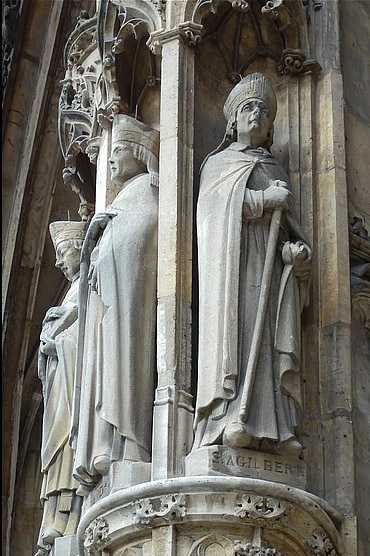 When St. Agilbert (image left), Bishop of the West Anglo-Saxons (Wessex), came to pay a visit to King Oswi and his son,
Aldfrid entreated him to ordain St. Wilfrid to the priesthood, that he might always remain near him. St. Agilbert remarked that a
person of such merit ought some day to be promoted to the episcopacy; he ordained him priest in 663, in the monastery of Ripon.
When St. Agilbert (image left), Bishop of the West Anglo-Saxons (Wessex), came to pay a visit to King Oswi and his son,
Aldfrid entreated him to ordain St. Wilfrid to the priesthood, that he might always remain near him. St. Agilbert remarked that a
person of such merit ought some day to be promoted to the episcopacy; he ordained him priest in 663, in the monastery of Ripon.
As mentioned above, the Britons and the Scotch-Irish followed an erroneous calculation of Easter; so that King Oswi,
who had been instructed by them, and his Queen Eanflede, daughter of Edwin, who came from Kent, sometimes kept Lent and Easter at
different times in the same court. The Scots and Britons were not schismatics; they did not coincide with the Quartodecimans,
who had been condemned by the Church (so-called because they insisted that Easter should be celebrated on the Jewish Passover –
the fourteenth day of Nisan
– rather than on a Sunday), nor had their difference in opinion proceeded to a breach in
communion (in fact they celebrated Easter on a Sunday – the dispute being over which Sunday). Nevertheless the problem
was serious enough that, to put an end to the dispute, a conference was held in 664 at the great monastery of St. Hilda, at
Streanaeshealth (now Whitby), before the Kings Oswi and Aldfrid (image below).
St. Colman of Lindisfarne brought thither his Scotch-Irish clergy; on the other side St. Agilbert had with him Agatho,
a priest from Paris, Romanus, the Abbot St. Wilfrid, and the deacon James. St. Colman alleged the examples of his predecessors,
and of St. Columba himself, and professed his belief that their practice had been established by St. John the Evangelist; which
assertion would have been difficult to prove. St. Wilfrid replied that the agreement of all the churches of Africa, Asia, Egypt,
Greece, Gaul, Rome, Italy, and the rest of the world, ought to have more weight than that of the Picts and Britons in a part of the
two most remote islands of the ocean; that St. John could not reject at once all the observances of the Old Law, on account of the
many Jewish Christians; but that after the death of St. John the custom which St. Peter established at Rome, was observed by his
successors in Asia, and by the universal Church, and was commanded by the Nicene Council; that the Britons and Picts followed
neither St. Peter nor St. John – neither the Old Law nor the Gospel; that St. Columba and the rest of their ancestors were without
fault, because they knew no better; but that whoever refused to be instructed were inexcusable. He added that Christ had said to
St. Peter: Thou art Peter, and upon this rock I will build My Church, and the gates of Hell shall not prevail against it. And I
will give thee the keys of the kingdom of Heaven; and whatever thou shalt bind on earth shall be bound in Heaven, etc.
(Matt. 16: 18-19).
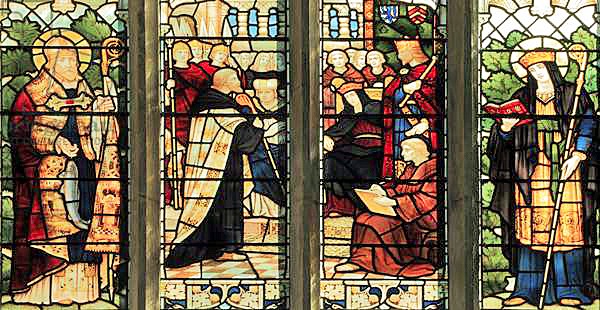
Hereupon King Oswi asked: Do you all, of both parties, acknowledge that Our Lord said this particularly to St. Peter,
and that the Lord gave him the keys of the kingdom of Heaven?
They replied: We acknowledge it.
Then the King concluded:
I declare, that I will not oppose this keeper of the gate of Heaven, and that I will obey his orders to the utmost of my power,
lest he shut that gate against me.
This resolution of the King was approved by the whole assembly. Historians have had to
confess that King Oswi acknowledged a prerogative of St. Peter above the rest of the Apostles, and that on this account he preferred
the practice which St. Peter had established at Rome, over that which he thought derived from St. John. It is evident from the very
silence of both parties, that the Scotch-Irish and Britons never called into question the supremacy of the Bishop of Rome.
After this there began that difficult time in England mentioned in the life of
St. Theodore of Canterbury. Along with the decimation of the clergy and hierarchy caused by the plague, there was the problem
of the division of dioceses demanded by certain rulers. When Bishop Agilbert had his diocese divided, he returned to his native France,
where he was offered the See of Paris. So when St. Tuda of Lindisfarne died of the plague, after having served as Bishop of York for
only one year, King Aldfrid desired Abbot Wilfrid to succeed him as Bishop. The King sent the Saint to France, that he might be
consecrated by the same St. Agilbert who had ordained him. Bishop Agilbert joyfully received St. Wilfrid, and with twelve other bishops,
performed the ceremony with great solemnity at Compiegne. St. Wilfrid was then, in 664, in the thirtieth year of his age.
But as he was absent a long time on this journey, King Oswi caused St. Chad to be consecrated in St. Wilfrid's place.
At his return into England he would not dispute the election of St. Chad; but retired to Ripon, which monastery he made
his residence for three years, though he was often called to Mercia to ordain deacons and priests and to perform other episcopal
functions. He was called there by King Wulfhere, who had been a pagan for some time, but at length became a zealous propagator of the
Faith, and who, governed by the counsels of St. Wilfrid, founded monasteries and churches in several parts of Mercia.
St. Theodore, Archbishop of Canterbury, found the election of St. Chad to have been irregular, and removed him;
but, impressed with his humility and virtue, placed him in the See of Litchfield. At the same time he put St. Wilfrid in possession
of the See of York in 669, just before the death of King Oswi. At first the Saint fared well under the new King Egfrid. The monastic
state was a principal object of St. Wilfrid’s care, as well as the promoting of Gregorian Chant.
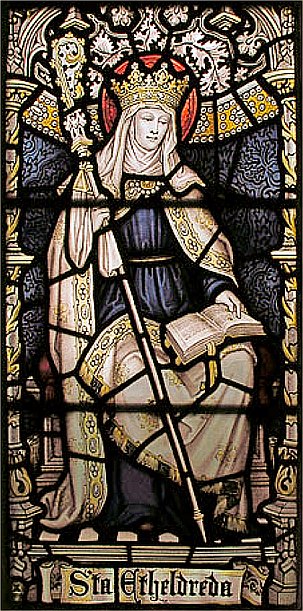 King Egfrid had extorted a consent to marriage from St. Etheldreda (feast – June 23), the daughter of a king and
widow of a prince who had allowed her to remain a virgin, as she preferred the religious life. He had died only three years after
their marriage, after which she lived an angelic life for five years on the Isle of Ely. She only consented to the marriage with
Egfrid if she could continue to preserve her virginity; for twelve years the holy Queen lived like a sister rather than a wife with
the King. St. Wilfrid endeavored at first to persuade her to change her resolution; but finding her will inflexible, at length
consented to give her the veil, thus confirming her vow. This action exceedingly provoked the King, who proceeded to put away
St. Etheldreda (who became Abbess of a monastery on Ely) and marry Ermenberga. The new Queen employed every base means to entirely
ruin St. Wilfrid in the opinion of her husband. In order to undermine him, a project was set afoot for dividing his bishopric,
after the holy prelate had spent ten years in settling Christianity in it. St. Theodore, who had the authority as Archbishop of
Canterbury, was convinced by specious pretenses to do so. St. Wilfrid, for opposing this partition, was rejected; but appealed to
the Pope. Dreading a disturbance or schism, he raised no clamor; but being too well versed in the canons not to see the irregularity
and nullity of many steps that had been taken against him, he embarked for Rome. Being driven by contrary winds at sea upon the
coast of Friesland, he was moved to compassion upon seeing the spiritual blindness and idolatry of the inhabitants, and preached
the Faith to them. During that winter and the following spring he stayed among them, converted and baptized many thousands,
including several lords of the country. Thus he opened that harvest which St. Willibrord and others, excited by his example,
afterwards cultivated. St. Wilfrid has therefore been honored as an apostle to that country.
King Egfrid had extorted a consent to marriage from St. Etheldreda (feast – June 23), the daughter of a king and
widow of a prince who had allowed her to remain a virgin, as she preferred the religious life. He had died only three years after
their marriage, after which she lived an angelic life for five years on the Isle of Ely. She only consented to the marriage with
Egfrid if she could continue to preserve her virginity; for twelve years the holy Queen lived like a sister rather than a wife with
the King. St. Wilfrid endeavored at first to persuade her to change her resolution; but finding her will inflexible, at length
consented to give her the veil, thus confirming her vow. This action exceedingly provoked the King, who proceeded to put away
St. Etheldreda (who became Abbess of a monastery on Ely) and marry Ermenberga. The new Queen employed every base means to entirely
ruin St. Wilfrid in the opinion of her husband. In order to undermine him, a project was set afoot for dividing his bishopric,
after the holy prelate had spent ten years in settling Christianity in it. St. Theodore, who had the authority as Archbishop of
Canterbury, was convinced by specious pretenses to do so. St. Wilfrid, for opposing this partition, was rejected; but appealed to
the Pope. Dreading a disturbance or schism, he raised no clamor; but being too well versed in the canons not to see the irregularity
and nullity of many steps that had been taken against him, he embarked for Rome. Being driven by contrary winds at sea upon the
coast of Friesland, he was moved to compassion upon seeing the spiritual blindness and idolatry of the inhabitants, and preached
the Faith to them. During that winter and the following spring he stayed among them, converted and baptized many thousands,
including several lords of the country. Thus he opened that harvest which St. Willibrord and others, excited by his example,
afterwards cultivated. St. Wilfrid has therefore been honored as an apostle to that country.
The perpetual trouble-maker Ebroin, either through the solicitations of the Saint's enemies in England, or on account of
his own enmity towards St. Wilfrid – who had defended St. Annemund, sent letters to Aldgisl, King of Friesland, promising to give him
a bushel of gold, if he would send him Bishop Wilfrid, or his head. The King read the letters publicly before St. Wilfrid,
the messengers, and his own officers, and then tearing them to pieces with indignation, threw them into the fire, expressing the
utmost detestation of such base treachery.
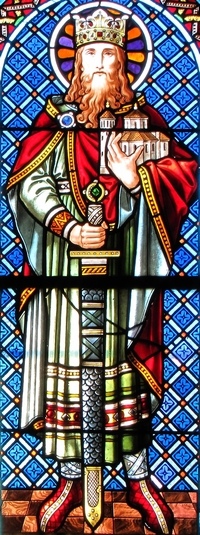 Next summer St. Wilfrid, leaving his new converts with great reluctance under the direction of proper pastors, traveled through
Austrasia, where King St. Dagobert II (image right) entertained him most honorably, and entreated him to fill the bishopric
of Strasburg, which happened then to be vacant. (This is the same St. Dagobert mentioned in St. Louis Marie de Montfort's
True Devotion to Mary as one of the earliest to publicly consecrate himself to the Blessed Virgin Mary. He died in a
Next summer St. Wilfrid, leaving his new converts with great reluctance under the direction of proper pastors, traveled through
Austrasia, where King St. Dagobert II (image right) entertained him most honorably, and entreated him to fill the bishopric
of Strasburg, which happened then to be vacant. (This is the same St. Dagobert mentioned in St. Louis Marie de Montfort's
True Devotion to Mary as one of the earliest to publicly consecrate himself to the Blessed Virgin Mary. He died in a hunting
accident
at the hands of none other than Ebroin. As many considered this a murder, St. Dagobert II has been, like St. Annemund,
honored as a martyr.) Upon his refusal, this prince nonetheless gave him very considerable gifts, and sent Adeodatus, Bishop of Toul,
to accompany him to Rome, where he arrived late in the year 679. He found Pope St. Agatho already apprised of what had passed in
England by a monk whom St. Theodore had dispatched on his side with letters. The Pope was preparing to hold a great Council against
the Monothelites. In the meantime, to discuss this cause, he assembled a synod in October, 679, in the Lateran Basilica, consisting of
above fifty bishops and priests. The causes of the dissension in the English church having been weighed, it was decreed, by the
authority of St. Peter, that there should be in it one Archbishop honored with the Pallium, who should promote and canonically
consecrate the bishops to the other Sees; but that none of the bishops should presume to meddle with the rights of any other prelate,
but all should strive to instruct and convert the people.
After this, St. Wilfrid presented his petition in person to the Pope and the bishops assembled. The synod exceedingly
commended his moderation, in that he had raised no disturbance or resistance by contumacy, but had been content to calmly enter his
protestation and appeals, while professing that he would submit to whatever was determined. It was definitively decreed that he
should be restored to his bishopric. St. Wilfrid stayed more than four months at Rome, and assisted at the great Lateran Council
of one hundred twenty-five bishops, in which he with the rest condemned the Monothelite heresy.
When he arrived in England, he showed King Egfrid the sealed decrees of the Pope. This prince, when he had first
caused them to be read to the prelates of his own faction that were in the room with him, cried out that they had been obtained by
bribery, and commanded that St. Wilfrid be committed to prison, where he was detained nine months. They took from him everything
but the clothes he then wore, and sent his attendants away. Queen Ermenberga took away his case of relics, which she hung up in
her chamber, and carried about with her in her carriage whenever she went out.
The holy Bishop's guards heard him sing psalms in his dark dungeon, and beheld a light which terrified them; and the
Saint having cured the governor's wife with holy water, he refused to guard him any longer, and the King ordered him to be moved to
another prison. At length the Queen was seized with a sudden fit of sickness while visiting a monastery, and the Abbess whereof
(who was St. Ebba, the King's aunt) reminded her of the injustice done to St. Wilfrid – whereupon he was set at liberty, his relics
restored, and his companions sent back to him.
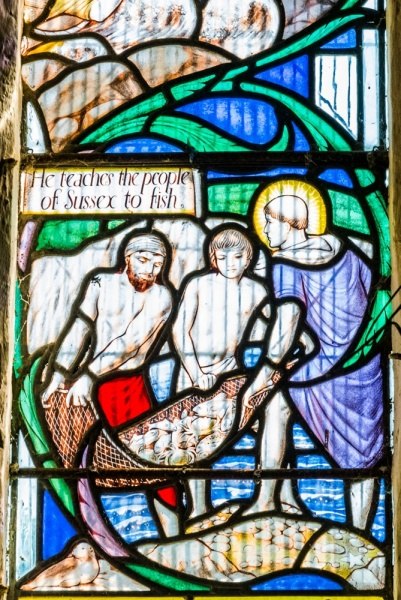 St. Wilfrid, who was inflamed with an ardent zeal for the conversion of infidels and the salvation of souls, repaired to the Kingdom
of the South Anglo-Saxons (Sussex), which had not yet received the light of Faith. Aethelwealh the King, who had been lately
baptized in Mercia, where King Wulfhere was his godfather, received the Saint with open arms. St. Wilfrid converted the whole nation
by his preaching, including all the priests of the idols. That country was oppressed with a dreadful famine – no rain having fallen
for three years; but on the day on which St. Wilfrid first administered Baptism with great solemnity to an incredible number of the
nobility and people, abundant rains fell. The Saint also taught the people the art of net-fishing, which was a great relief to them.
In the first attempt they caught three hundred fish, of which the Saint induced them to give one hundred to the poor, and as many to
those of whom they had borrowed their nets – keeping the like number for their own use.
St. Wilfrid, who was inflamed with an ardent zeal for the conversion of infidels and the salvation of souls, repaired to the Kingdom
of the South Anglo-Saxons (Sussex), which had not yet received the light of Faith. Aethelwealh the King, who had been lately
baptized in Mercia, where King Wulfhere was his godfather, received the Saint with open arms. St. Wilfrid converted the whole nation
by his preaching, including all the priests of the idols. That country was oppressed with a dreadful famine – no rain having fallen
for three years; but on the day on which St. Wilfrid first administered Baptism with great solemnity to an incredible number of the
nobility and people, abundant rains fell. The Saint also taught the people the art of net-fishing, which was a great relief to them.
In the first attempt they caught three hundred fish, of which the Saint induced them to give one hundred to the poor, and as many to
those of whom they had borrowed their nets – keeping the like number for their own use.
The Saint sent a priest to the Isle of Wight, whither the Faith had not yet penetrated, and he had the satisfaction to
see all the inhabitants regenerated in the waters of life. Cadwalla, King of Wessex, to whom that island was then subject, sent for
St. Wilfrid and took his advice. The Saint chiefly resided in the peninsula of Selsey, and cultivated this vineyard five years, till,
upon the death of King Egfrid, he was called back to Northumberland.
As was mentioned in Issue No. 209, St. Theodore of Canterbury, being above
eighty years of age, and seized with frequent bouts of sickness, sent to St. Wilfrid, requesting that he would meet with him at London,
with Erchambald, Bishop of that city. He humbly confessed to them all the actions of his life; then he said to St. Wilfrid:
The greatest remorse I feel is that I consented with the King to deprive you of your possessions, without any fault committed
on your part. I confess this my crime to God and St. Peter; and I take Them both to witness that I will do all that lies in my power
to make amends for my fault, and to reconcile you to all the kings and lords who are my friends. God has revealed to me that I shall
not live to the end of this year. I conjure you to consent that I may establish you, within my lifetime, as Archbishop of my See.
St. Wilfrid replied: May God and St. Peter pardon you all our differences. I will always pray for you as your friend. Send letters
to your friends, that they may restore to me part of my possessions, according to the decree of the Holy See. The choice of a successor
in your See will be afterwards considered in a proper assembly.
Pursuant to this agreement, St. Theodore wrote to King Aldfrid – who had returned to the throne of Northumberland,
to King Ethelred of Mercia, and others. Aldfrid having received these letters, recalled the holy Bishop towards the end of the year 686,
and restored to him his monastery of Hexham, and soon after that of Ripon, and the episcopal See of York. The bishops who had occupied
the divided Sees willingly relinquished them to him; they were holy men, well qualified for their ministry, who in simplicity had only
taken upon themselves a charge which their immediate superiors had imposed upon them.
St. Wilfrid, after his restoration, reduced Hexham and Ripon from bishoprics to their original condition of mere
monasteries. St. Cuthbert, who had from the beginning sustained the episcopal charge only in obedience and by compulsion
(he had refused to become bishop of Hexham but reluctantly agreed to become bishop of Lindisfarne), retired to Inner Farne upon
St. Wilfrid's return, and died there the following year – 687. St. Wilfrid was, therefore, obliged to take upon himself the care of
the diocese of Lindisfarne, until a new bishop could be chosen.
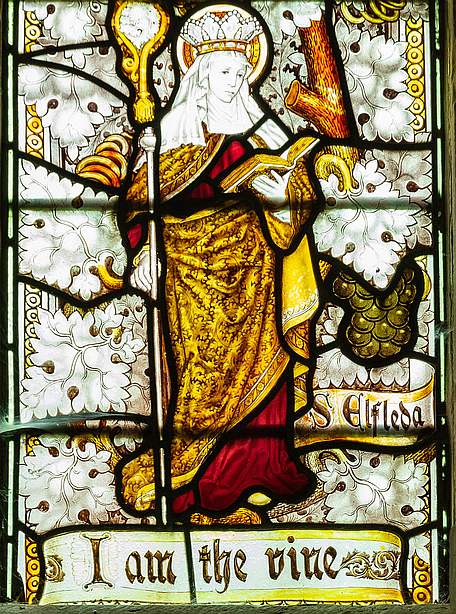 The irreproachable conduct, the vigilance, and the indefatigable zeal of the holy Prelate ought to have stopped the
mouths of his enemies; but these very virtues, which enraged the devil, raised new storms against him. King Aldfrid (whose sister
was the holy Abbess of Whitby, St. Elfleda) then decided to have a new bishopric elected at Ripon. As St. Wilfrid was opposed
to the project, he was obliged once more to flee – only five years after he had been restored. He took refuge with Ethelred,
King of the Mercians, who re-ceived him most graciously, and entreated him to take upon himself the care of the See of Litchfield,
which was then vacant. The good Bishop's discourses on the vanity of the world, and the infinite importance of salvation, made such
an impression on the King, that, in hopes more easily to secure a happy eternity, he shortly thereafter made the decision to relinquish
his crown and put on the monastic habit at the Abbey of Bardney, where he became Abbot.
The irreproachable conduct, the vigilance, and the indefatigable zeal of the holy Prelate ought to have stopped the
mouths of his enemies; but these very virtues, which enraged the devil, raised new storms against him. King Aldfrid (whose sister
was the holy Abbess of Whitby, St. Elfleda) then decided to have a new bishopric elected at Ripon. As St. Wilfrid was opposed
to the project, he was obliged once more to flee – only five years after he had been restored. He took refuge with Ethelred,
King of the Mercians, who re-ceived him most graciously, and entreated him to take upon himself the care of the See of Litchfield,
which was then vacant. The good Bishop's discourses on the vanity of the world, and the infinite importance of salvation, made such
an impression on the King, that, in hopes more easily to secure a happy eternity, he shortly thereafter made the decision to relinquish
his crown and put on the monastic habit at the Abbey of Bardney, where he became Abbot.
Our Saint founded many monasteries and churches in Mercia, and usefully employed his labors there; until his enemies
in Northumberland successfully deceived St. Brithwald, Archbishop of Canterbury, and were soliciting a sentence of deposition
against him. He therefore appealed a second time to Rome, and took another journey thither in 703. His accusers appeared there
against him, but to their own confusion. Pope John VI honorably acquitted the Saint, who had in everything proceeded according to the
canons. His very enemies always acknowledged his life to be irreproachable; and a bishop cannot be deposed unless a canonical fault
be proved against him in a synod. If it was thought necessary to divide his bishopric, this was not to be done without his concurrence,
and withal reserving to him his own See. Moreover, this persecution was raised by court envy, jealousy, and resentment. These were
the instruments which conjured up the storm, and the secret springs which put in motion the engines that were employed against this
servant of God, through the simplicity or ignorance of many, the malice of some, and the complaisance and condescension of others.
The holy Prelate being the best-skilled in sacred learning and in the canons of the Church in all Britain, as St. Theodore
on his death-bed acknowledged him to be, was too great a disciplinarian for some at court. How pure his views were, and how remote
from avarice and ambition, appeared from his charity towards his persecutors, the meekness with which he maintained the rights of his
See and the discipline of the Church, and the humility and disinterestedness with which he refused the bishopric of the Mercians,
and excused himself from acquiescing in the earnest request of St. Theodore, when he desired to make him his successor in the
metropolitan See of Canterbury. If he had acquired riches, he knew no other use of what he possessed than to employ it in the
foundation of churches and in the relief of the poor. He rejoiced to see others share the fruits of his harvest; and though opposed
in every advance that he made, he never threw away the laboring oar, or grew remiss in his ministry, or in quickening others to the
utmost exertion of their zeal in the cause of God. Such a character appeared in the most shining light to all impartial judges,
and St. Wilfrid met at Rome with that protection and applause which were due to his heroic virtue. Pope John VI, in 704, sent letters
by an express messenger to the Kings of Mercia and Northumberland in favor of the persecuted Bishop, charging Archbishop Brithwald to
call a synod which should do him justice; in default of which he ordered the parties to make their personal appearance at Rome.
As he started his return, St. Wilfrid was taken dangerously ill at Meaux in France – under which malady St. Bede
relates that he was assured by a heavenly vision that Our Lord Jesus Christ, through the intercession of His Holy Mother Mary,
and at the prayers of his friends, had prolonged his life four more years. When he landed in England, St. Brithwald promised
heartily to concur in his restoration to his former See. Ethelred, the former King of Mercia, but now Abbot of Bardney, received
him with great joy, and warmly recommended to him his nephew Coenred, to whom he had resigned his crown when he had forsaken the world.
Coenred was so inflamed with the love of heavenly things by the conversation he had with the holy man, that he conceived a great desire
also to renounce the world – which project he afterwards executed in the year 709, the fourth of his reign. Coenred then traveled to
Rome with Offa, King of Essex. Both took the monastic habit and, persevering with great fervor to their last hours, died happily in
that city.
King Aldfrid continued to cause problems; but died in 705. In his last sickness, he repented of the injustice he had
done to St. Wilfrid – as his sister St. Elfleda, Abbess of Whitby (image above), gave testimony. His restitution, therefore,
was easily agreed to by the whole kingdom, under Osred I, who being only eight years old, succeeded his father – Brithric being regent
during his minority.
St. Wilfrid took possession of the diocese of Hexham, but chiefly resided in his monastery of Ripon, leaving York to
St. John of Beverley. He governed the monasteries in Mercia of which he had been the founder, and which were afterwards destroyed
by the Danes. He died at one of those at Undulum – now called Oundle – in Northamptonshire, on April 24, 709, having divided his
possessions between his monasteries, churches, and the former companions of his exile. His body was buried in his Church of St. Peter
at Ripon. That monastery having been destroyed by the wars, most of his relics were translated to Canterbury in the time of St. Odo,
and deposited under the high altar in 959. They were enshrined by Lanfranc, and deposited on the north side of the altar by St. Anselm
on October 12 – the day of which translation became his principal festival. These relics are said now to repose near the monument of
that truly great man, Reginald Cardinal Pole.
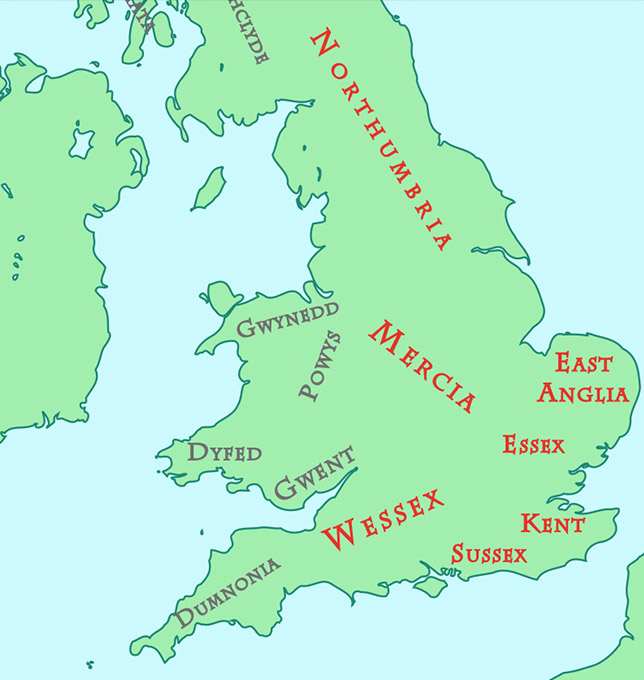
The Seven Anglo-Saxon Kingdoms of the Seventh Century
True virtue is always governed by the same principle, and always steers the same course. In prosperity it is humble,
modest, and timorous; in adversity it is magnanimous, and equally active and brave. To suffer from good men is often the severest
of trials; but from whatever quarter persecution comes, it is our duty not to sink under it, but sincerely to humble ourselves both
before God and man. We must not be daunted, considering that on one side it is the part only of cowards to be pusillanimous or to
despair; on the other, it is arrogance and pride to fall into impatience, or to repay injuries with revenge, insults, or ill will.
St. Wilfrid saw the clouds gather, and ready to burst over his head; yet was undaunted. He never reviled his persecutors – never
complained of the envy and malice of those who stirred up whole kingdoms against him. When he died, the envy died – and immediately
the whole world gave due praise to the purity of his intentions, the ardor of his zeal for virtue and discipline, and the sanctity
of his life. British historians unanimously conspire in paying a grateful tribute to his memory, which is consecrated in the Roman
and other Martyrologies.
Back to "In this Issue"
Back to Top
Back to Saints
Alphabetical Index; Calendar List of Saints
Contact us: smr@salvemariaregina.info
Visit also: www.marienfried.com


 St. Wilfrid was born in the Kingdom of Northumbria, towards the year 634. At fourteen years of age he was sent to the monastery
of Lindisfarne that he might be trained in the study of the sacred sciences, in which he showed an application, penetration, and
maturity of judgment beyond his years. A desire of greater improvement than he could attain to in that place, where he perceived
the discipline that was practiced to be imperfect, led him upon a project of traveling into France and Italy. He made a short stay
at Canterbury, where he studied the Roman discipline, and learned the Psalms according to the Roman version, instead of that of
St. Jerome, which he had used before. (St. Jerome actually produced three Latin translations of the Psalms: the Roman version –
which was merely a revision of that which had already been in use before his time, and which was used in the Roman Missal;
the Gallican version – based on the Greek text, and which was used in the Vulgate Bible and the Roman Breviary; and the Hebrew version –
based on the Hebrew manuscripts then available. St. Jerome considered this last to be the most accurate, but it was not widely accepted.
It is frequently referred to as
St. Wilfrid was born in the Kingdom of Northumbria, towards the year 634. At fourteen years of age he was sent to the monastery
of Lindisfarne that he might be trained in the study of the sacred sciences, in which he showed an application, penetration, and
maturity of judgment beyond his years. A desire of greater improvement than he could attain to in that place, where he perceived
the discipline that was practiced to be imperfect, led him upon a project of traveling into France and Italy. He made a short stay
at Canterbury, where he studied the Roman discipline, and learned the Psalms according to the Roman version, instead of that of
St. Jerome, which he had used before. (St. Jerome actually produced three Latin translations of the Psalms: the Roman version –
which was merely a revision of that which had already been in use before his time, and which was used in the Roman Missal;
the Gallican version – based on the Greek text, and which was used in the Vulgate Bible and the Roman Breviary; and the Hebrew version –
based on the Hebrew manuscripts then available. St. Jerome considered this last to be the most accurate, but it was not widely accepted.
It is frequently referred to as  When St. Agilbert (image left), Bishop of the West Anglo-Saxons (Wessex), came to pay a visit to King Oswi and his son,
Aldfrid entreated him to ordain St. Wilfrid to the priesthood, that he might always remain near him. St. Agilbert remarked that a
person of such merit ought some day to be promoted to the episcopacy; he ordained him priest in 663, in the monastery of Ripon.
When St. Agilbert (image left), Bishop of the West Anglo-Saxons (Wessex), came to pay a visit to King Oswi and his son,
Aldfrid entreated him to ordain St. Wilfrid to the priesthood, that he might always remain near him. St. Agilbert remarked that a
person of such merit ought some day to be promoted to the episcopacy; he ordained him priest in 663, in the monastery of Ripon.
 King Egfrid had extorted a consent to marriage from St. Etheldreda (feast – June 23), the daughter of a king and
widow of a prince who had allowed her to remain a virgin, as she preferred the religious life. He had died only three years after
their marriage, after which she lived an angelic life for five years on the Isle of Ely. She only consented to the marriage with
Egfrid if she could continue to preserve her virginity; for twelve years the holy Queen lived like a sister rather than a wife with
the King. St. Wilfrid endeavored at first to persuade her to change her resolution; but finding her will inflexible, at length
consented to give her the veil, thus confirming her vow. This action exceedingly provoked the King, who proceeded to put away
St. Etheldreda (who became Abbess of a monastery on Ely) and marry Ermenberga. The new Queen employed every base means to entirely
ruin St. Wilfrid in the opinion of her husband. In order to undermine him, a project was set afoot for dividing his bishopric,
after the holy prelate had spent ten years in settling Christianity in it. St. Theodore, who had the authority as Archbishop of
Canterbury, was convinced by specious pretenses to do so. St. Wilfrid, for opposing this partition, was rejected; but appealed to
the Pope. Dreading a disturbance or schism, he raised no clamor; but being too well versed in the canons not to see the irregularity
and nullity of many steps that had been taken against him, he embarked for Rome. Being driven by contrary winds at sea upon the
coast of Friesland, he was moved to compassion upon seeing the spiritual blindness and idolatry of the inhabitants, and preached
the Faith to them. During that winter and the following spring he stayed among them, converted and baptized many thousands,
including several lords of the country. Thus he opened that harvest which St. Willibrord and others, excited by his example,
afterwards cultivated. St. Wilfrid has therefore been honored as an apostle to that country.
King Egfrid had extorted a consent to marriage from St. Etheldreda (feast – June 23), the daughter of a king and
widow of a prince who had allowed her to remain a virgin, as she preferred the religious life. He had died only three years after
their marriage, after which she lived an angelic life for five years on the Isle of Ely. She only consented to the marriage with
Egfrid if she could continue to preserve her virginity; for twelve years the holy Queen lived like a sister rather than a wife with
the King. St. Wilfrid endeavored at first to persuade her to change her resolution; but finding her will inflexible, at length
consented to give her the veil, thus confirming her vow. This action exceedingly provoked the King, who proceeded to put away
St. Etheldreda (who became Abbess of a monastery on Ely) and marry Ermenberga. The new Queen employed every base means to entirely
ruin St. Wilfrid in the opinion of her husband. In order to undermine him, a project was set afoot for dividing his bishopric,
after the holy prelate had spent ten years in settling Christianity in it. St. Theodore, who had the authority as Archbishop of
Canterbury, was convinced by specious pretenses to do so. St. Wilfrid, for opposing this partition, was rejected; but appealed to
the Pope. Dreading a disturbance or schism, he raised no clamor; but being too well versed in the canons not to see the irregularity
and nullity of many steps that had been taken against him, he embarked for Rome. Being driven by contrary winds at sea upon the
coast of Friesland, he was moved to compassion upon seeing the spiritual blindness and idolatry of the inhabitants, and preached
the Faith to them. During that winter and the following spring he stayed among them, converted and baptized many thousands,
including several lords of the country. Thus he opened that harvest which St. Willibrord and others, excited by his example,
afterwards cultivated. St. Wilfrid has therefore been honored as an apostle to that country. Next summer St. Wilfrid, leaving his new converts with great reluctance under the direction of proper pastors, traveled through
Austrasia, where King St. Dagobert II (image right) entertained him most honorably, and entreated him to fill the bishopric
of Strasburg, which happened then to be vacant. (This is the same St. Dagobert mentioned in St. Louis Marie de Montfort's
True Devotion to Mary as one of the earliest to publicly consecrate himself to the Blessed Virgin Mary. He died in a
Next summer St. Wilfrid, leaving his new converts with great reluctance under the direction of proper pastors, traveled through
Austrasia, where King St. Dagobert II (image right) entertained him most honorably, and entreated him to fill the bishopric
of Strasburg, which happened then to be vacant. (This is the same St. Dagobert mentioned in St. Louis Marie de Montfort's
True Devotion to Mary as one of the earliest to publicly consecrate himself to the Blessed Virgin Mary. He died in a  St. Wilfrid, who was inflamed with an ardent zeal for the conversion of infidels and the salvation of souls, repaired to the Kingdom
of the South Anglo-Saxons (Sussex), which had not yet received the light of Faith. Aethelwealh the King, who had been lately
baptized in Mercia, where King Wulfhere was his godfather, received the Saint with open arms. St. Wilfrid converted the whole nation
by his preaching, including all the priests of the idols. That country was oppressed with a dreadful famine – no rain having fallen
for three years; but on the day on which St. Wilfrid first administered Baptism with great solemnity to an incredible number of the
nobility and people, abundant rains fell. The Saint also taught the people the art of net-fishing, which was a great relief to them.
In the first attempt they caught three hundred fish, of which the Saint induced them to give one hundred to the poor, and as many to
those of whom they had borrowed their nets – keeping the like number for their own use.
St. Wilfrid, who was inflamed with an ardent zeal for the conversion of infidels and the salvation of souls, repaired to the Kingdom
of the South Anglo-Saxons (Sussex), which had not yet received the light of Faith. Aethelwealh the King, who had been lately
baptized in Mercia, where King Wulfhere was his godfather, received the Saint with open arms. St. Wilfrid converted the whole nation
by his preaching, including all the priests of the idols. That country was oppressed with a dreadful famine – no rain having fallen
for three years; but on the day on which St. Wilfrid first administered Baptism with great solemnity to an incredible number of the
nobility and people, abundant rains fell. The Saint also taught the people the art of net-fishing, which was a great relief to them.
In the first attempt they caught three hundred fish, of which the Saint induced them to give one hundred to the poor, and as many to
those of whom they had borrowed their nets – keeping the like number for their own use. The irreproachable conduct, the vigilance, and the indefatigable zeal of the holy Prelate ought to have stopped the
mouths of his enemies; but these very virtues, which enraged the devil, raised new storms against him. King Aldfrid (whose sister
was the holy Abbess of Whitby, St. Elfleda) then decided to have a new bishopric elected at Ripon. As St. Wilfrid was opposed
to the project, he was obliged once more to flee – only five years after he had been restored. He took refuge with Ethelred,
King of the Mercians, who re-ceived him most graciously, and entreated him to take upon himself the care of the See of Litchfield,
which was then vacant. The good Bishop's discourses on the vanity of the world, and the infinite importance of salvation, made such
an impression on the King, that, in hopes more easily to secure a happy eternity, he shortly thereafter made the decision to relinquish
his crown and put on the monastic habit at the Abbey of Bardney, where he became Abbot.
The irreproachable conduct, the vigilance, and the indefatigable zeal of the holy Prelate ought to have stopped the
mouths of his enemies; but these very virtues, which enraged the devil, raised new storms against him. King Aldfrid (whose sister
was the holy Abbess of Whitby, St. Elfleda) then decided to have a new bishopric elected at Ripon. As St. Wilfrid was opposed
to the project, he was obliged once more to flee – only five years after he had been restored. He took refuge with Ethelred,
King of the Mercians, who re-ceived him most graciously, and entreated him to take upon himself the care of the See of Litchfield,
which was then vacant. The good Bishop's discourses on the vanity of the world, and the infinite importance of salvation, made such
an impression on the King, that, in hopes more easily to secure a happy eternity, he shortly thereafter made the decision to relinquish
his crown and put on the monastic habit at the Abbey of Bardney, where he became Abbot.
